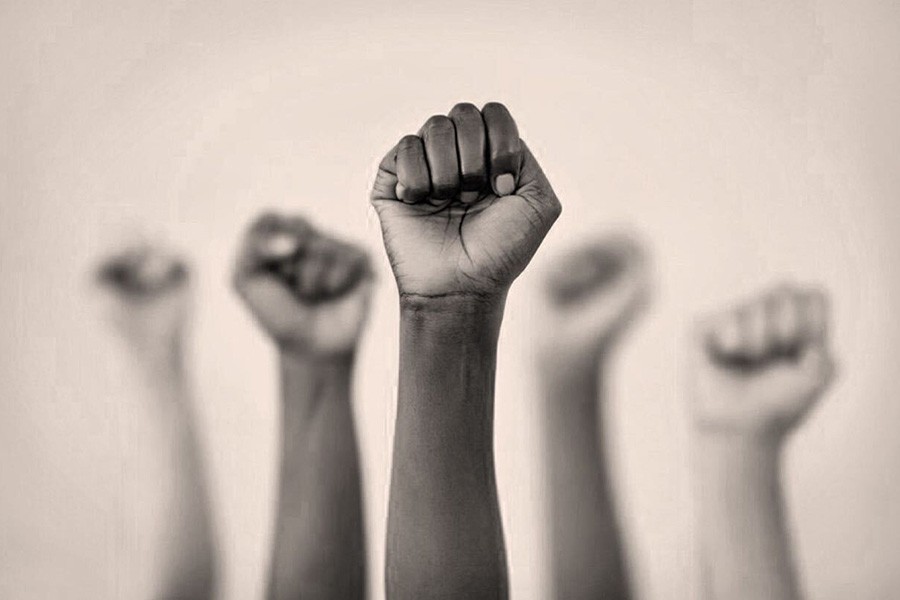Besides Protesting, Here Are Five Ways to Actively Support the Black Lives Matter Movement in Boston
Advocate for legislative bills, support Black-owned businesses, and other efforts you can make from home.

Image by LaylaBird via Getty
Night after night this week, Americans have masked up and met up in Boston and across the country to protest racial inequality and police violence, and to make the unequivocal statement that Black Lives Matter. But you don’t need to physically stand next to the protestors to stand with them. Everybody can help build a more equitable society by committing themselves to better understanding historical contexts and Black experiences; listening to and amplifying Black voices; and recognizing ways to actively practice antiracism in your own life. In the words of Emerson College president Lee Pelton, “This is not a black problem, but a structural issue built on white supremacy and centuries of racism.”
Here are five ways to demonstrate support for the Black Lives Matter movement—even if you’re not at a demonstration.
Write to tell your representatives you are holding them accountable.
The recent killings of George Floyd, Breonna Taylor, and other Black Americans at the hands of white police officers and vigilantes ignited this most recent round of protests, but flames of racial injustice have burned in our country for centuries. It will take action on every level of government to create meaningful change. Here’s an online resource to help you find your representatives on the local, county, state, and federal levels. Send them emails and/or make phone calls asking them to support criminal justice reform, invest in community services like schools and public health facilities, and work toward equitability.
On the state level, you can ask your representative to support a bill currently being drafted by state Rep. Liz Miranda to limit police use of force, as well as three current bills sponsored by Boston Rep. Russell Holmes: Boston.com reports that members of the Massachusetts Black and Latino Legislative Caucus called on their colleagues this week to pass a bill which would set standards for the hiring, training, ethical conduct, and retention of law enforcement officers. Two other pieces of legislation would establish an office to review and reform the existing diversity plans of all state agencies, as well as commission a study on how institutional racism has fueled the criminal justice system in Massachusetts.
Defund.Email, meanwhile, uses Instagram to share suggested language to use to ask local representatives to defund law enforcement agencies. The web archive offers a one-click way to email Mayor Marty Walsh and the Boston City Council to demand they reduce the Boston Police Department budget and reinvest the money in local Black and Brown communities.
On the national level, Boston’s own Rep. Ayanna Pressley has co-sponsored, along with Minnesota Rep. Ilhan Omar, a House resolution condemning police violence, racial profiling, and the use of excessive force. Has your representative added their voice to Pressley’s call? Contact their office to ask your representative to speak out now about the need for the House to pass this resolution immediately.
Color Of Change is a national, online organization that aims to fight racial injustices around crime and policing, voting and democracy, economics and housing, media and culture, and beyond. Right now, it is spearheading a campaign seeking justice for the death of Breonna Taylor, who was killed by Louisville Metro Police in her own apartment during a misdirected, no-knock warrant search; among other causes such as asking Congress to protect Black-owned businesses during the COVID crisis. Check out its resources designed to help people respond effectively to injustices all around us.
And remember: To really hold officials accountable, you need to be registered to vote.
Amplify Black voices.
Now is a good time to think critically about how you use your platform on social media. Prioritize voices from Black leaders, artists, musicians, actors, entrepreneurs, athletes, and other people you admire. Looking for some new names—and book titles—to add to your offline reading list? Boston has compiled plenty of recommendations chosen by Black local authors, and Boston Public Library has some ideas, as well. You should also check out The African American Literature Book Club, which is a treasure trove of resources. When it comes to understanding systemic inequalities and social movements, there’s always room to go deeper.
Support Black-owned businesses.
This is a really tangible way to invest in the Black community in Boston. Here is Boston magazine’s list of local black-owned restaurants currently open for takeout, and here is the story behind the local Black Hospitality Coalition formed to financially help support them through the COVID crisis. The Black Economic Council of Massachusetts also works to advance the economic well-being of Black residents in the Bay State. On Instagram, @BlackOwnedBos shares information and links about local Black businesses, creatives, entrepreneurs, spaces, and resources; and Black Boston has a robust web directory of minority-owned companies, as well.
Offer money, supplies, or your time.
Here are places in Boston where you can donate to support either the ongoing movement to protest police brutality, or more broadly work to improve Black lives around Boston.
Stay connected.
Not able to join in this week’s protests? Don’t let that deter you: Fighting systemic racial inequality in America isn’t a week-long effort. It’s long-term work. Build up your networks and resources, commit to spending the time, and keep moving forward.

